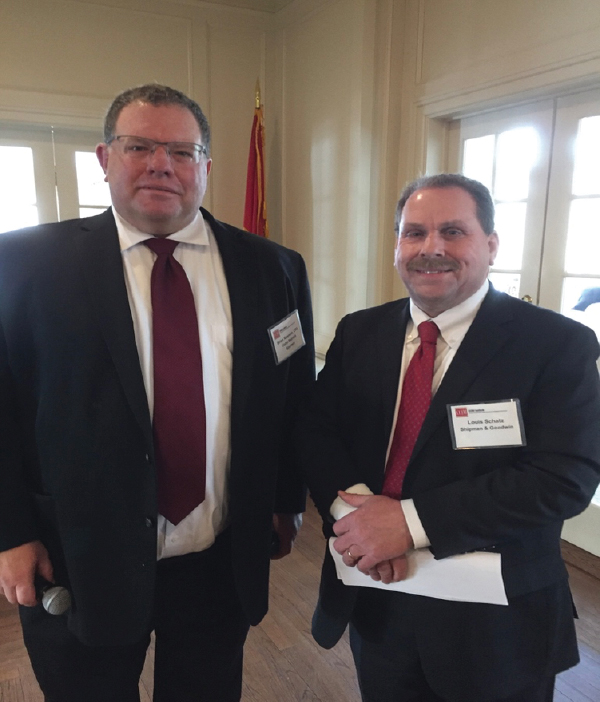
and Louis Schatz
Kensington, CT CCIM Connecticut Chapter hosted a breakfast meeting at Shuttle Meadow Country Club. The meeting was a 2018 Commercial Real Estate Tax Info Session. Brian Newman, CPA, with Cohn Reznick and Attorney Louis Schatz, Esq., with Shipman & Goodwin were presenters.
This event was attended by 54 professionals, CCIM members and guests in varied businesses related to commercial real estate – there to hear about the Trump tax cuts and Jobs Act effect on many keys areas.
Real Estate related provisions include: new individual and corporate tax rates, qualified business income pass thru deduction, bonus depreciation and section 179, interest expense limitation, excess business losses, carried interest, like-kind exchange, technical terminations and lifetime gift exemption.
Individual tax rates have come down overall and the Alternative Minimum Tax has increased exemption amounts and increased phase-outs.
The keystone of the entire act is that the corporate tax rate has been reduced to 21% from 35%. This now matches the worldwide average. Corporate AMT is eliminated. Personal service corporations have no penalty and also receive the 21% rate.
The Qualified Business Income Deduction is 20% of domestic qualified income from partnerships, S Corps or sole proprietorships. This is factored into taxable income after AGI. This also applies to REIT and publicly traded partnerships. The deduction starts to be phased out for specified service businesses.
100% Bonus Depreciation for qualifying property “acquired” and placed in service after 9/27/17 and before 1/1/23. The deduction will phase down starting 2023 thru 2026.
Regarding Qualified Improvement Property, the separate definitions of qualified leasehold, qualified restaurant, and qualified retail improvement property are eliminated. QIP is depreciated straight line over 15 years. For ADS purposes, the new lives are as follows: 20 years for QIP, 30 years for residential real property, and 40 years for non-residential real property.
Regarding the Carried Interest Provision; for partnership interests received in connection with services consisting of raising or returning capital and either investing in (or disposing of) specified assets (or identifying specified assets for such investing or disposition) or developing specified assets: there is a three year holding period requirement for the partnership interest in the underlying investments to be eligible for long-term capital gains rates.
Section 1031 Like-Kind Exchanges have been eliminated except for real estate. Personal property is not eligible even as part of the same exchange.
The Federal Estate Tax Lifetime Exclusion is now $10 million ($11.2 million after inflation adjustments).
Newman is a frequent speaker and author on issues involving federal and state taxation and partnership taxation matters, and was appointed as an adjunct professor for the University of Hartford’s Master of Science in Taxation program.
Schatz is a frequent lecturer on federal and State of Connecticut tax, partnership and limited liability company issues. For many years he has been providing annual updates on Connecticut tax developments to accountants practicing in New York and New Jersey.








